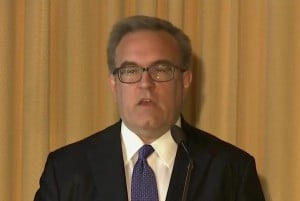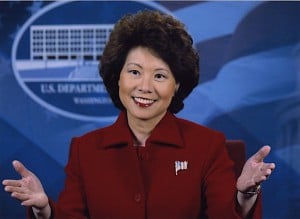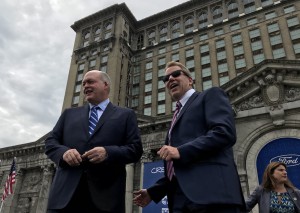
The White House officially unveiled a set of proposed revisions to the federal fuel economy standards that, government officials claimed, will lower vehicle costs and get more, safer vehicles on the road, saving an estimated 1,000 lives annually.
The much-anticipated rollback of the Obama-era Corporate Average Fuel Economy, or CAFE, standards came under immediate assault from consumer and environmental groups. Additionally it is not even clear what support the proposal will generate from the auto industry, however, as some key automakers have indicated their willingness to live with the tougher guidelines set back in 2012.

“We are delivering on President Trump’s promise to the American public that his administration would address and fix the current fuel economy and greenhouse gas emissions standards,” Andrew Wheeler, the Acting Environmental Protection Agency Administrator said in a statement.
A former coal industry lobbyist, Wheeler last month took over the EPA after the resignation of Scott Pruitt following a series of ethical scandals. Pruitt led the push to rollback the current CAFE mandate which would have required automakers to steadily raise mileage until reaching a fleet average of 54.5 miles per gallon by 2025. Due to credits and adjustments, the real-world figure would have been in the low- to mid-40 mpg range. The new plan laid out Thursday would freeze the figure at the level set for 2020, around 37 mpg.
(DOT rolls back fuel economy mandates to current levels. Click Here for the story.)
The revisions – which were jointly developed by the EPA and the National Highway Traffic Safety Administration – follow a “mid-term review” that was written into the 2012 regulations and which were supposed to take into account a variety of different factors, including costs, safety, fuel prices, the environment and consumer acceptance.

The Trump administration, however, reached a very different conclusion than what the Obama White House reached weeks before leaving office in January 2017. Then, the conclusion was that automakers would be able to deliver on the original CAFE mandate.
Thursday’s announcement generated an immediate pushback. “How can we justify rolling back the most effective tool we have to fix global warming?” asked Rob Sargent, Energy Program director for Environment America.
“Our analysis clearly indicates that the car companies are fully capable of meeting the CAFE standards and they are able to do so with great savings for consumers,” said Jack Gillis, the Consumer Federation of America’s director of public affairs.
The question of cost was one that EPA and NHTSA officials used to justify the proposed revisions, however. During a media conference call, NHTSA Deputy Administrator Heidi King said the mid-term review conducted by the Trump Administration concluded the average new vehicle would increase in price by $2,340 by 2025 — while reducing overall, long-term costs to the U.S. projected at $500 billion. As a result, the original, 54.5 mpg target would mean more expensive cars that many consumers couldn’t afford to buy.
In turn, EPA Assistant Administrator Bill Wehrum said that would have a “detrimental impact … on highway safety” by delaying the rollout of improved vehicle technology. The two agencies estimate the proposal could reduce U.S. highway fatalities by 1,000 lives annually.
The goal, Wehrum repeated several times during the call, is to find the “sweet spot” between cost, emissions and safety.

(Click Here to see how Trump mileage rules could cost drivers billions of dollars.)
Those opposing a rollback question the numbers the government has been using, especially in light of both the Obama-era mid-term analysis and what has happened, in real-world terms, since the 54.5 mpg standard was enacted in 2012. If anything, vehicles have gotten substantially cleaner and more fuel-efficient even as American motorists have migrated by the millions from downsized sedans and coupes to larger SUVs and pickups.
King downplayed that by suggesting that the industry has been able to benefit from tapping “low-hanging fruit” – such as engine stop/start technology and more advanced transmissions – but will have to use more expensive technologies to make the bigger gains that would have been called for by 2025.
Several industry trade groups hailed the new proposal, though not all automakers are equally supportive. After initially calling on President Trump to relax CAFE, Ford Motor Co. CEO Jim Hackett and Chairman Bill Ford recently issued a statement saying, “We support increasing clean car standards through 2025 and are not asking for a rollback.” Several other automakers, including Nissan and Honda, have told NBC News that they plan to continue targeting the original mileage numbers.
It is unclear what the final figures will be, in fact, as EPA and NHTSA rolled out a series of optional plans, though clearly favoring the 2020 freeze. A series of hearings will follow before any final action can be taken, and it is widely expected that a rollback would face stiff legal opposition, at least one lawsuit already moving through the federal courts.
Opposition is expected to grow even stiffer due to the plan’s call to eliminate the waiver granted to California under the Clean Air Act to set its own standards for carbon dioxide emissions. Since CO2 levels are directly related to mileage, the state could effectively require the industry to hold to the original Obama CAFE target. And, with 10 other states and the District of Columbia adopting the tougher California mandate, that would cover about a third of the new vehicles sold in the U.S. each year.
“It makes no sense in the world to have a two-car program,” asserted Wehrum, arguing that the original goal was to let California set standards specifically aimed at reducing the pollutants that cause the state’s endemic smog problems.
(To see more about EPA, DOT eliminating California’s Clean Air Act exemption, Click Here.)
Eliminating the twin standards is one area where the auto industry agrees with the Trump administration, but that could create even more of a legal challenge as the White House moves forward with the CAFE rollback.








I wish everyone stop stating what the costs will be for this or that. We have all been hearing it since the 1970’s when MPG/EPA standards started. It is really all part of R&D with or without meeting government requirements. In the last forty years of meeting government mandates, we have incredible fuel efficiency, horsepower more than double of the same displacement and on top of it all the exhaust is cleaner than ever.
Auto companies that continue to exceed MPG and EPA mandates will benefit. On the next world’s round of oil price increases and the price of gas starts to hurt, the MPG wars will start and those with the highest will win.
One improvement from the auto companies that we all benefited from and without government mandate is the engine coolant. Every manufacture now has coolant that will last five years or 60-100 miles. It has prevented million of gallons of coolant being drained at the curb when every two years was the norm. Kodo’s for enginnering.
R & D must continuously be an investment for any company’s future with or without government mandates. Without it there is no future.
There were a LOT of issues with the OAT coolant, particularly with GM’s Dex-Cool. So much so that lawsuits were filed against them. This led to HOAT coolant which is much-much better than the original OAT.
But agree with your other statements. The companies that continue to reach for the higher efficiency numbers will win out (again) once the crude prices shoot up and petrol prices scream back up to the $4 ~ $5 range.
Guzzlers and Polluters will be hit again. And the question is will they be bailed out again.